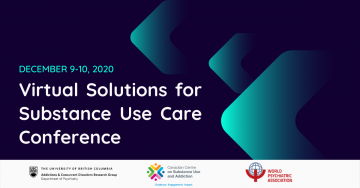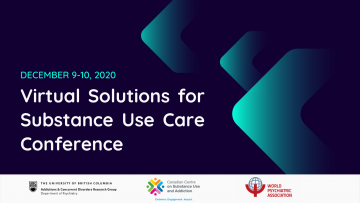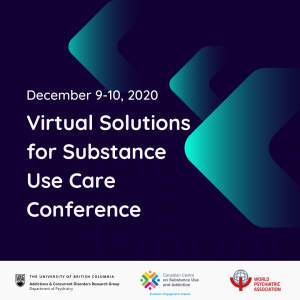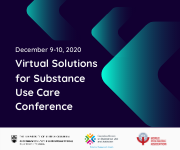Register Here
download the preliminary program

The COVID-19 pandemic proved that a lot of medicine can be delivered virtually. A lot of sentiments were corrected and a lot of anxieties were proven wrong. Online resources can help to build capacity and provide better access to patients who need care and can’t get it. Web-based systems can help to better organize clinical pathways and provide additional tools, which are giving access to psychotherapy and expertise beyond the current system.
With this conference, we will provide a good overview of the core elements of virtual mental health care given by international colleagues. From online prevention to psychotherapy and from risk assessment and management to virtual clinics. In workshops, you will get the opportunity to learn more about ongoing projects in detail with the opportunity for exchange and networking. The Canadian Centre on Substance Use and Addiction, The The University of British Columbia Addictions and Concurrent Disorders Research Group, and the World Psychiatric Association section for informatics and telemedicine have brought together a significant group of pioneers in this field with the aim of broadening the efforts of mental health and substance use care.
Keynote Speakers

Dr Michael Krausz
Leadership Chair, Addiction Research at the University of British Columbia
Chair, World Psychiatric Association section on informatics and telemedicine

Dr Maree Teesson
Director, The Matilda Centre for Research in Mental Health and Substance Use

Dr Michael Schaub
Director, Swiss Research Institute of Public Health and Addiction

Dr Damon Ramsey
Founder and CEO, InputHealth
Workshops
Sign-up for workshops here
Due to limited space, participants must sign-up for workshops in addition to registering for the conference. To facilitate discussion and allow time for questions, workshops are designed for a small group of participants. Workshops within each block are co-occurring, so participants can sign-up for one workshop per block, but cannot attend multiple workshops in the same block. There is no additional fee to attend workshops. If you cannot make it to a workshop you have signed up for or would like to sign-up for a different workshop, please email desiree.chek@ubc.ca
View the workshop descriptions below
Drug overdose has become a global problem. In British Columbia, during the Seven months of COVID pandemic period, more than 1048 people died from an overdose. In comparison, this is significantly more than COVID itself. Within health care, Machine Learning (ML) methods have been increasingly developed to predict the likelihood of diseases. In this workshop, we will demonstrate how can these methods help us to better predict the likelihood of overdose among substance users and prevent them. Presented by Alireza Kazemi, MD, PhD, and Andy Tai, BSc Neuroscience, MSc Candidate Neuroscience Following the presentation of the risk assessment and management model in the keynote presentation, attendees will have the opportunity to discuss the concept in detail including the different functionalities of the online platform. Presented by Dr Michael Krausz and Dr Damon Ramsey The Swiss experience of online applications for supporting controlled consumption of cocaine and other stimulants will be presented and discussed. Presented by Dr Michael Schaub There is great promise of the use of Artificial Intelligence (AI) within all aspects of healthcare. This workshop will introduce participants to the basic concepts of AI, provide insights into emerging AI technologies within the mental health field, and explore the practical application of AI into the healthcare context using a suicide decision support case study. This workshop is intended to help health care professionals and organizations understand their AI readiness and examine their own AI needs, and spark discussion on the compassionate use of these technologies. Presented by Dr David Wiljer, Lydia Sequeira, and Sarah Younus Meta Cognitive training is a therapeutic program that asks patients to evaluate thought patterns and recognize dysfunctional cognitions. MCT has been effective in aiding patients with a variety of psychological disorders and is now being developed for people who struggle with substance use. This workshop will explore the new MCT for Substance Use and will engage the audience through activities and thoughtful discussion. Presented by Marisha Boyd, BSc Candidate Behavioural Neuroscience and Kate Phillips, BA Candidate Psychology In this workshop, the participant will: Presented by Dr Peter Selby
Switzerland is supporting online prevention initiatives addressing high-risk substance use among adolescents. Experiences with speciality mental health programs will be introduced from the developers including an evaluation of the programs and its limitations. Presented by Severin Haug, PhD This webinar will provide: This webinar will provide: Presented by Dr Maree Teesson, Dr Smriti Nepal, and Dr Kylie Routledge The current pandemic makes preventative activities even more relevant. In Canada, the double challenge of the overdose crisis and COVID-19 pandemic create a specific situation. Experiences and potential of online programs addressing the situation will be presented and discussed. Presented by Dr Daniel Vigo This workshop will cover results from a recent poll conducted in July 2020 which gathered opinions from British Columbians about their awareness and perceptions regarding the overdose crisis, substance use and prevention, and related educational programs, particularly those targeted for youth. An alarming 29% of young adults reported that a peer aged 18-24 had experienced a drug overdose, while 38% of adults 25+ stated they know someone personally who has had an overdose. Given the impact of the current overdose situation and the fact that youth themselves want more knowledge about overdose prevention and the relationship between mental health and substance use, we will explore the possibilities of utilizing web-based programs for substance use prevention, particularly its implementation in BC schools. Presented by Dr Fiona Choi and Dr Kerry Jang This seminar introduces participants to the concepts and techniques of co-design and co-development for online solutions. Drawing on real case studies, we will examine the opportunities for effective co-design and examine the role of co-designing with clients and end-users through and for digital solutions. In this workshop, you will: Presented by Dr. David Wiljer, Andrew Johnson, and the Thought Spot Research Team
MCT is a group training based on the principles of cognitive behavioural therapy. In this workshop, the recently developed Gambling-MCT, as well as an online intervention (Restart) for problem gambling, will be presented. Potential and limits of group face to face vs. online training will be discussed in this session. Presented by Josefine Gehlenborg, MSc Controlled use of psychotropic substances is a concept which is becoming more and more relevant for substance users, especially those still integrated into society. Online resources can be helpful to support the monitoring and management of controlled substance use, which will be discussed based on the experiences with cannabis. Presented by Dr Michael Schaub The use of alcohol, tobacco, and other drugs often starts in adolescence. It is important to address the related risks and substance use in general during adolescence and early adulthood to avoid ongoing problems. The possibilities of that based on the campus experiences will be reflected and discussed in this breakout session. Presented by Dr Daniel Vigo Tobacco is one of the most important public health threats based on psychotropic substance use, especially because smoking cessation programs have been successfully implemented through online support strategies. Existing programs are also a good example for other domains of substance use disorder care. Presented by Dr Christian Schuetz The online platform Wellness Together Canada is a comprehensive online resource to address a variety of common mental illness and substance use issues. Its principles and functionalities will be presented and discussed. Presented by Dr Peter Cornish
The need for better access to opiates substitution treatment is well known in Canada and elsewhere. The conceptual framework and its limitations of online substitution clinics will be presented and discussed together with clinicians in the field. Presented by Dr Pouya Azar, Dr Nick Mathew, and Dr Adam Chodkiewicz Virtual clinics that go beyond videoconferencing could be a veritable alternative or extension of existing treatment settings. They could support the integration of online medicine and physical institutions. Based on the keynote presentation, the trends and opportunities of virtual clinics will be presented and discussed in detail. Presented by Dr Damon Ramsey The COVID-19 pandemic has led to a few remarkable online solutions supporting the handling of this situation. Based on experiences with a crisis management platform, the functionalities and limitations with administration will be presented and discussed. Presented by Dr Richard Spence and Jean Westenberg, MSc Candidate Experimental Medicine
1. The Application of Machine Learning Methods and Predictive Modelling in the Field of Addiction Psychiatry


2. The Risk Assessment and Management Platform


3. Responding to Cocaine and Stimulant Use

4. Training to Apply Artificial Intelligence

5. Meta Cognitive Training for Substance Use

6. Technology-Enabled Collaborative Care for addiction and mental health

7. eHealth Programs for Addiction Prevention Among Adolescents in Switzerland

8. Positive Choices: Addressing the evidence-practice gap in alcohol and other drug prevention
Strong & Deadly Futures: a computerised school-based alcohol and drug prevention program for Aboriginal and Torres Strait Islander students



9. Responding to the double challenge of COVID and overdose

10. What do BC citizens of different generations think about overdose and prevention?


11. Co-development and co-design developing online solutions

12. Group vs. online training for problem and pathological gambling – Gambling-MCT and Restart

13. Controlled Cannabis use – adherence and effectiveness

14. Youth specific psychosocial interventions

15. Smoking cessation

16. Wellness together Canada - an online offer for Canadians

17. Online substitution clinics


18. Virtual clinic platforms

19. Experiences with virtual care during COVID 19 – crisis management platform

ePosters and Lightning Talks
View the ePoster Gallery
Submissions for ePosters and Lightning Talks will be accepted on a rolling basis until December 2nd.
Submissions are open to everyone. Lightning Talk submissions will be evaluated and the selected presenters will be contacted 3 days after their submission.
- ePosters will be shared on our website for attendees to browse.
- Lighting Talk Presentations are short 5-minute presentations (usually 3.5 minutes of speaking, plus 1.5 minutes for questions).
- Please indicate on the Abstract Submission Form if, in addition to presenting an ePoster, you wish to be considered to present a Lightning Talk during the conference.
For an ePoster, you must submit:
- Abstract (maximum 1,500 characters)
- Poster in PowerPoint format
- Optional voice recording in mp4 format
- Optional link to the full article if applicable
To be considered for a Lightning Talk, you must also submit:
- 1 to 5 slides for your presentation
Lighting Talks will be evaluated based on the categories listed below:
- Covers a critical topic for the development of the field
- Reflects lived experiences
- Appropriate and important for the target audience
- Presents a clear position
- Communicates thought-provoking ideas
Promotional Toolkit
Thank you so much for helping us promote the Virtual Solutions for Substance Use Care Conference. Working with you to encourage attendees to join us will help build a robust community of both diverse and interlinked stakeholders to enhance the virtual meeting experience.
This toolkit offers several communication items to help spread the word about the Virtual Solutions for Substance Use Care Conference on December 9-10, 2020.
The drop-in content is designed to be used across your communication channels—including your website, newsletter, email lists, or social media pages. You can also use the key messages below to create your own promotional content.
If you cannot find what you need, please contact desiree.chek@ubc.ca.
Sample Email for Speakers
Subject:
Join me at the Virtual Solutions for Substance Use Care Conference Dec 9-10, 2020
Body:
I hope you’ll join me and other colleagues at the Virtual solutions for Substance Use Care Conference on December 9-10, 2020.
I’m excited to be speaking about [insert your session title] at the conference. This will also be an opportunity to learn about international experiences in healthcare and research.
The Canadian Centre of Substance Use and Addiction, The World Psychiatric Association Section on Informatics and Telemedicine, and The University of British Columbia Addictions and Concurrent Disorders Research Group have brought together international leaders in Substance Use Care. Keynote speakers at the event are:
- Dr Michael Krausz, Leadership Chair in Addiction Research at UBC and Chair of the World Psychiatric Association Section on Informatics and Telemedicine;
- Dr Maree Teesson, Director of The Matilda Centre for Research in Mental Health and Substance Use;
- Dr Michael Schaub, Director of the Swiss Research Institute of Public Health and Addiction;
- Dr Damon Ramsey, Founder and CEO of Input Health.
Presentations will cover a range of innovative solutions for substance use care such as online psychotherapies, virtual prevention tools, risk assessment, and virtual substitution clinics. Workshops will give participants an opportunity to discuss the most pressing topics in virtual substance use care. CCSA’s CEO, Rita Notarandrea and Dr Michael Krausz will provide opening remarks.
Please register for the Virtual Solutions for Substance Use Care Conference and learn more about the program here: http://bit.ly/VSSUCC
[Note: See email signature graphic below, which may be used in your email]
Sample Email for Individuals
Subject:
Join me at the Virtual Solutions for Substance Use Care Conference Dec 9-10, 2020
Body:
I hope you’ll join me and other colleagues at the Virtual solutions for Substance Use Care Conference on December 9-10, 2020.
The Canadian Centre of Substance Use and Addiction, The World Psychiatric Association Section on Informatics and Telemedicine, and The University of British Columbia Addictions and Concurrent Disorders Research Group have brought together international leaders in Substance Use Care. Keynote speakers at the event are:
- Dr Michael Krausz, Leadership Chair in Addiction Research at UBC and Chair of the World Psychiatric Association Section on Informatics and Telemedicine;
- Dr Maree Teesson, Director of The Matilda Centre for Research in Mental Health and Substance Use;
- Dr Michael Schaub, Director of the Swiss Research Institute of Public Health and Addiction;
- Dr Damon Ramsey, Founder and CEO of Input Health.
Presentations will cover a range of innovative solutions for substance use care such as online psychotherapies, virtual prevention tools, risk assessment, and virtual substitution clinics. Workshops will give participants an opportunity to discuss the most pressing topics in virtual substance use care. CCSA’s CEO, Rita Notarandrea and Dr Michael Krausz will provide opening remarks.
Please register for the Virtual Solutions for Substance Use Care Conference and learn more about the program here: http://bit.ly/VSSUCC
[Note: See email signature graphic below, which may be used in your email]
Sample Newsletter Blurb
Headline:
Register for the Virtual Solutions for Substance Use Care Conference (December 9-10)
Text:
Join international colleagues at the Virtual Solutions for Substance Use Care Conference. Registration is free.
This conference will provide a good overview of the core elements of virtual mental health care given by international colleagues. From online prevention to psychotherapy and from risk assessment and management to virtual clinics. In workshops, you will get the opportunity to learn more about ongoing projects in detail with the opportunity for exchange and networking. The Canadian Centre on Substance Use and Addiction, The University of British Columbia Addictions and Concurrent Disorders Research Group, and the World Psychiatric Association section for informatics and telemedicine have brought together a significant group of pioneers in this field with the aim of broadening the efforts of mental health and substance use care.
Learn more about the conference and register here: http://bit.ly/VSSUCC
[Note: See email newsletter graphic below, which may be used in your newsletter]
PDF Invitations
Invitation to Register - Download
Sample Social Media Posts
Speakers
Sample Tweets
- I’m speaking at #VSSUCC! @CCSACanada, @CCDUSCanada, @ACDResearch and @WPA_psychiatry have collaborated to host the Virtual Solutions for Substance Use Care Conference. Register to join me: http://bit.ly/VSSUCC
- #VSSUCC registration is now open! Get ready to discuss virtual solutions for substance use care. Register now: http://bit.ly/VSSUCC
- I’m speaking at #VSSUCC. Don't miss my session and register here to join the conversation about virtual solutions for substance use care. Register now: http://bit.ly/VSSUCC
- Interested in INSERT SESSION TOPIC? Attend my session #VSSUCC session at the Virtual Solutions for Substance Use Care Conference. Register now: http://bit.ly/VSSUCC
Sample Linkedin Post
- I’m presenting at the Virtual Solutions for Substance Use Care Conference. Come to my session, INSERT SESSION NAME IF APPLICABLE to learn about INSERT SESSION. Register now: http://bit.ly/VSSUCC
Sample Facebook Post
- I’m excited to announce that I’ll be speaking at #VSSUCC on Dec 9th and 10th. Register today and join the conversation about virtual solutions for substance use care. http://bit.ly/VSSUCC
Organizations
Sample Tweets
- Registration is now open for #VSSUCC! We’ve collaborated with @CCSACanada, @CCDUSCanada, @ACDResearch and @WPA_psychiatry to hold a conference on virtual solutions for substance use care. Register now: http://bit.ly/VSSUCC
- The Virtual Solutions for Substance Use Care Conference is coming up soon. Join colleagues from across the healthcare community to discuss the core elements of virtual mental health care. Register now: http://bit.ly/VSSUCC
- We’re looking forward to #VSSUCC! Register here to attend the Virtual Solutions for Substance Use Care Conference on Dec 9th and 10th. http://bit.ly/VSSUCC
Sample Facebook Post
- Join us for a conference in collaboration with the Canadian Centre on Substance Use and Addiction, UBC and the World Psychiatric Association on virtual solutions for substance use care. Register now: http://bit.ly/VSSUCC
Sample Linkedin Post
- Register now to attend the Virtual Solutions for Substance Use Care Conference. Join colleagues from across the healthcare community on Dec 9th and 10th to learn the core elements of virtual mental health care. Register here: http://bit.ly/VSSUCC
Individuals
Sample Tweets
- I'll be attending #VSSUCC on Dec 9th and 10th. @CCSACanada, @CCDUSCanada, @ACDResearch, and @WPA_psychiatry have collaborated to host the Virtual Solutions for Substance Use Care Conference. Join me and colleagues from across the healthcare community. Register here: http://bit.ly/VSSUCC
Sample Facebook Post
- The Virtual Solutions for Substance Use Care Conference is coming up soon! Join me and other colleagues. Register here: http://bit.ly/VSSUCC
Sample LinkedIn Post
- I’m looking forward to attending the Virtual Solutions for Substance Use Care Conference on Dec 9th and 10th. Join me and colleagues from across the healthcare community to discuss the core elements of virtual mental health care. http://bit.ly/VSSUCC
Twitter graphic (1600x900)
Instagram and Facebook graphic (1080x1080)
Email header graphic (600x200)
Email newsletter graphic (180x150)



